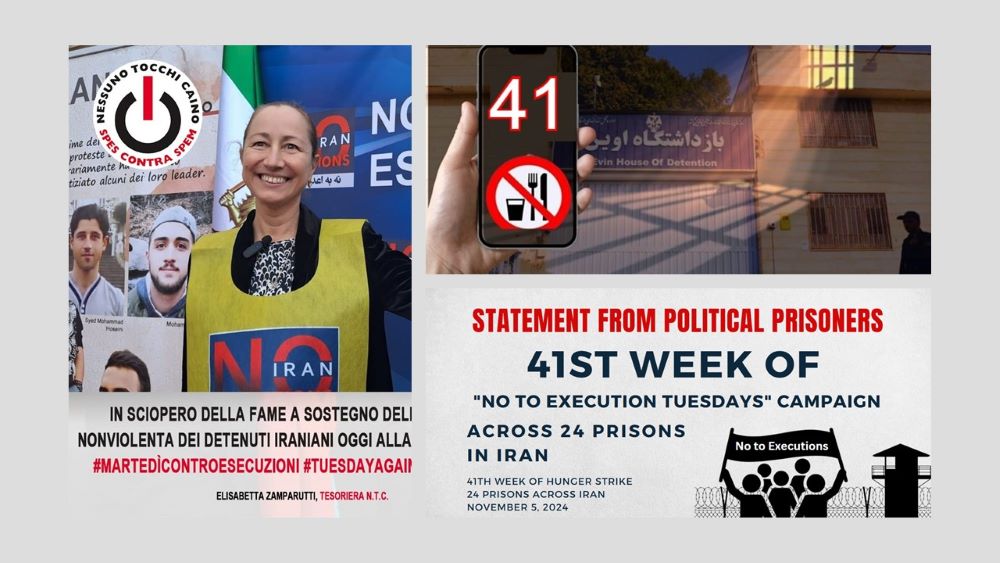
The “No to Execution Tuesdays” campaign in Iran has reached its 41st week, with political prisoners across 24 prisons participating in hunger strikes to protest against the death penalty. This movement has gained significant momentum, highlighting the urgent need for action regarding the Iranian government’s increasing reliance on capital punishment.
Overview of the Campaign
Objectives: The primary aim of the “No to Execution Tuesdays” campaign is to raise awareness about the plight of political prisoners facing execution and to advocate for the abolition of the death penalty in Iran. Participants argue that the death penalty is used as a means of political repression rather than a tool for justice, emphasizing its inhumane nature.
Current Participation: During the 41st week of the campaign, numerous prisons participated, including Evin (women’s ward, wards 4 and 8), Ghezel Hesar (units 3 and 4), Karaj Central Prison, Greater Tehran Prison, Arak Prison, Khorramabad Prison, Asadabad Prison in Isfahan, Sheiban Prison in Ahvaz, Nezam Prison in Shiraz, Bam Prison, Kahnuj Prison, Mashhad Prison, Qaemshahr Prison, Rasht Prison (men’s and women’s wards), Ardabil Prison, Tabriz Prison, Urmia Prison, Salmas Prison, Khoy Prison, Naqadeh Prison, Saqqez Prison, Baneh Prison, Marivan Prison, and Kamyaran Prison.
Recent Developments
In a statement for this week’s campaign, prisoners on strike declared, “Under the execution-driven regime, repression and executions are escalating. Since October 23, nearly 56 prisoners have been executed, with at least 23 hangings in just the past week.”
The statement also highlighted the closed-door trial of eight young individuals arrested during the 2022 protests, referred to as the Ekbatan case. “Given the severity of the charges against them, there is serious concern they may face death sentences.”
The declaration further spotlighted recent developments in the “No to Executions Tuesdays” campaign: “As of last week, the death sentences of four Baluch campaign members—Eid Shahbakhsh, Abdolghani Shahbakhsh, Abdolrahim Ghanbarzehi, and Soleiman Shahbakhsh—were upheld by the regime’s Supreme Court and referred to the Sentence Enforcement Office’s First Branch at District 33’s Prosecutor’s Office. Their executions could occur at any moment.”
The statement called on political activists, human rights defenders, and all people of conscience to raise their voices on behalf of these anonymous prisoners and others sentenced to death. It urged them to protest louder than ever, exposing those responsible for the machinery of execution and repression to the world’s conscience.
Iran’s Alarming Rise in Executions and Political Crackdowns
The human rights situation in Iran has sharply worsened in recent years, with a marked increase in state-led executions and oppressive tactics. October 2024 alone saw 170 documented executions—a staggering 85 percent rise from the 92 recorded in October 2023. This intensified use of the death penalty appears to be a means of quelling dissent and exerting control amidst escalating unrest. High-profile cases, especially involving individuals arrested during the 2022 protests and charged with serious offenses, have raised fears of politically motivated executions.
Beyond the surge in executions, the Iranian regime has ramped up arrests of dissidents, including supporters of opposition groups like the People’s Mojahedin Organization of Iran (PMOI/MEK). Reports indicate that several detainees have endured severe interrogations, including torture, under accusations such as “waging war against God.” Trials frequently take place behind closed doors, lacking transparency and violating basic due process. Since mid-September 2024, numerous PMOI supporters have received death sentences, underscoring the regime’s attempts to crush political opposition.
Support from Human Rights Advocates
Elisabetta Zamparutti, a member of the Italian human rights organization Hands Off Cain and former parliament representative, expressed her support for the campaign on her Facebook page. She wrote in part of her statement:
“Today I am also on a hunger strike to support prisoners on death row in Iran. In October alone, 161 people were executed, an increase of 106% compared to September’s tragic figures. Monitoring by Hands Off Cain indicates that there have been 681 executions since the start of the year.
Notably, Jamshid Sharmahd, an Iranian-German dual citizen and political prisoner, was executed secretly. Additionally, Mehdi Barahouei, a 21-year-old Baluchi prisoner sentenced for a crime committed at age 17, was also executed.
At least five women were among those executed in October across various prisons. Alarmingly, only 14 out of 161 cases (8.5%) were reported by state media.
The breakdown of charges includes 83 murders (51.5% of all executions), one political case, and numerous drug-related offenses.”
Conclusion
The “No to Execution Tuesdays” campaign exemplifies the resilience and determination of Iranian political prisoners fighting against state-sanctioned executions. As they continue their protests into the 41st week, their commitment underscores the critical need for global awareness and intervention to address human rights violations in Iran. The ongoing hunger strikes and calls for action reflect a broader struggle for justice and humanity within a repressive regime, emphasizing that the fight against capital punishment is far from over.